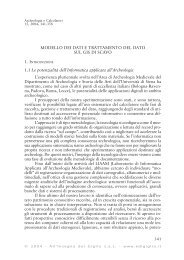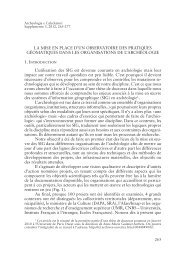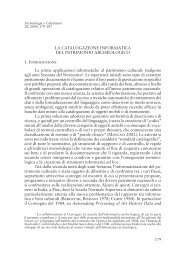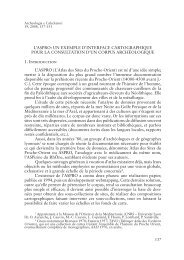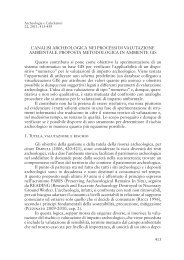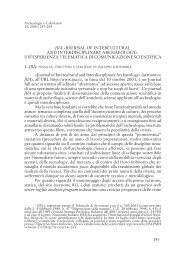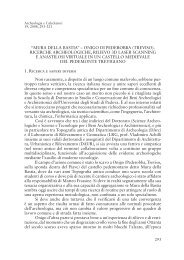- Page 2 and 3:
ARCHEOLOGIA E CALCOLATORI CNR - Dip
- Page 4 and 5:
Volume edito in collaborazione con
- Page 6 and 7:
A. Polcaro, V.F. Polcaro, Man and s
- Page 8 and 9:
La naissance de l’informatique en
- Page 10 and 11:
Ai problemi dei rapporti tra archeo
- Page 12 and 13:
E. Vesentini Ma, al di là di quest
- Page 14 and 15:
E. Vesentini 3. La Scuola Normale S
- Page 17 and 18:
Archeologia e Calcolatori 20, 2009,
- Page 19 and 20:
Informatica archeologica e non arch
- Page 21 and 22:
Informatica archeologica e non arch
- Page 23 and 24:
Informatica archeologica e non arch
- Page 25 and 26:
Informatica archeologica e non arch
- Page 27 and 28:
Archeologia e Calcolatori 20, 2009,
- Page 29 and 30:
From anarchy to good practice: the
- Page 31 and 32:
From anarchy to good practice: the
- Page 33 and 34:
From anarchy to good practice: the
- Page 35:
From anarchy to good practice: the
- Page 38 and 39:
D. Kurtz Fig. 2 - The Beazley Archi
- Page 40 and 41:
D. Kurtz Fig. 4 - The Ioannou Schoo
- Page 42 and 43:
D. Kurtz Fig. 6 - The Beazley Archi
- Page 44 and 45:
D. Kurtz Fig. 8 - http: // www.cvao
- Page 46 and 47:
D. Kurtz In the summer of 2008 we b
- Page 48 and 49:
P. Sommella che promosse, sotto l
- Page 50 and 51:
P. Sommella v’è oggi risposta vi
- Page 52 and 53:
P. Sommella ricerca per anni relega
- Page 54 and 55:
P. Sommella Ovviamente ciò che è
- Page 56 and 57:
P. Sommella teso in rete all’ediz
- Page 58 and 59:
P. Sommella Consalvi F. 2009, Il Ce
- Page 61 and 62:
Archeologia e Calcolatori 20, 2009,
- Page 63 and 64:
The golden years for mathematics an
- Page 65 and 66:
The golden years for mathematics an
- Page 67 and 68:
The golden years for mathematics an
- Page 69 and 70:
The golden years for mathematics an
- Page 71 and 72:
The golden years for mathematics an
- Page 73:
The golden years for mathematics an
- Page 76 and 77:
G. Lock computer programs the more
- Page 78 and 79:
G. Lock The importance of models ha
- Page 80 and 81:
G. Lock of technological determinis
- Page 82 and 83:
G. Lock it is possible to link peop
- Page 84 and 85:
G. Lock Lock G., Stančič Z. (eds.
- Page 86 and 87:
G. Semeraro 2. Gestione dei dati di
- Page 88 and 89:
G. Semeraro 3. GIS e dinamiche inse
- Page 90 and 91:
G. Semeraro lmati è stato realizza
- Page 92 and 93:
G. Semeraro Fig. 3 - Gli attori “
- Page 94 and 95:
G. Semeraro D’Andria F. (ed.) 199
- Page 96 and 97:
J.A. Barceló man acts are not divi
- Page 98 and 99:
J.A. Barceló the search for hypoth
- Page 100 and 101:
J.A. Barceló The rst synthetic mod
- Page 102 and 103:
J.A. Barceló data within the conse
- Page 104 and 105:
J.A. Barceló well-dened operators
- Page 106 and 107:
J.A. Barceló 6. Conclusions The fa
- Page 108 and 109:
J.A. Barceló Gardin J.-C. 1994, In
- Page 111 and 112:
Archeologia e Calcolatori 20, 2009,
- Page 113 and 114:
Representing knowledge in archaeolo
- Page 115 and 116:
Representing knowledge in archaeolo
- Page 117 and 118:
Representing knowledge in archaeolo
- Page 119 and 120:
Representing knowledge in archaeolo
- Page 121 and 122:
Representing knowledge in archaeolo
- Page 123 and 124:
Representing knowledge in archaeolo
- Page 125 and 126:
Representing knowledge in archaeolo
- Page 127 and 128:
Representing knowledge in archaeolo
- Page 129 and 130:
Archeologia e Calcolatori 20, 2009,
- Page 131 and 132:
Museo Virtuale dell’Informatica:
- Page 133 and 134:
Museo Virtuale dell’Informatica:
- Page 135 and 136:
Museo Virtuale dell’Informatica:
- Page 137 and 138:
Museo Virtuale dell’Informatica:
- Page 139 and 140:
Museo Virtuale dell’Informatica:
- Page 141 and 142:
Museo Virtuale dell’Informatica:
- Page 143 and 144:
Museo Virtuale dell’Informatica:
- Page 145 and 146:
Archeologia e Calcolatori 20, 2009,
- Page 147 and 148:
«Archeologia e Calcolatori»: le r
- Page 149 and 150:
«Archeologia e Calcolatori»: le r
- Page 151 and 152:
«Archeologia e Calcolatori»: le r
- Page 153 and 154:
«Archeologia e Calcolatori»: le r
- Page 155 and 156:
Archeologia e Calcolatori 20, 2009,
- Page 157 and 158:
Provando e riprovando: un quarto di
- Page 159 and 160:
Provando e riprovando: un quarto di
- Page 161 and 162:
Provando e riprovando: un quarto di
- Page 163 and 164:
Provando e riprovando: un quarto di
- Page 165 and 166:
Provando e riprovando: un quarto di
- Page 167 and 168:
Provando e riprovando: un quarto di
- Page 169 and 170:
Archeologia e Calcolatori 20, 2009,
- Page 171 and 172:
Punto di non-ritorno (Cartograa num
- Page 173 and 174:
Punto di non-ritorno (Cartograa num
- Page 175 and 176:
Punto di non-ritorno (Cartograa num
- Page 177:
Punto di non-ritorno (Cartograa num
- Page 180 and 181:
A. Caravale Documents, con la ricch
- Page 182 and 183:
A. Caravale e si sono occupati di t
- Page 184 and 185:
A. Caravale ritage 12 . Finalizzato
- Page 186 and 187:
A. Caravale Barocchi P., Fileti Maz
- Page 189 and 190:
Archeologia e Calcolatori 20, 2009,
- Page 191 and 192:
Da Te.m.p.l.a. al Centro di Ricerca
- Page 193 and 194:
Da Te.m.p.l.a. al Centro di Ricerca
- Page 195 and 196: Da Te.m.p.l.a. al Centro di Ricerca
- Page 197 and 198: Da Te.m.p.l.a. al Centro di Ricerca
- Page 199 and 200: Da Te.m.p.l.a. al Centro di Ricerca
- Page 201 and 202: Da Te.m.p.l.a. al Centro di Ricerca
- Page 203 and 204: Da Te.m.p.l.a. al Centro di Ricerca
- Page 205 and 206: Archeologia e Calcolatori 20, 2009,
- Page 207 and 208: From artefact typologies to cultura
- Page 209 and 210: From artefact typologies to cultura
- Page 211 and 212: From artefact typologies to cultura
- Page 213 and 214: From artefact typologies to cultura
- Page 215 and 216: From artefact typologies to cultura
- Page 217 and 218: From artefact typologies to cultura
- Page 219 and 220: From artefact typologies to cultura
- Page 221: From artefact typologies to cultura
- Page 224 and 225: A. Polcaro, V.F. Polcaro gist, who
- Page 226 and 227: A. Polcaro, V.F. Polcaro “Megalit
- Page 228 and 229: A. Polcaro, V.F. Polcaro the North
- Page 230 and 231: A. Polcaro, V.F. Polcaro 4.1 Positi
- Page 232 and 233: A. Polcaro, V.F. Polcaro the Moon p
- Page 234 and 235: A. Polcaro, V.F. Polcaro spani 2006
- Page 236 and 237: A. Polcaro, V.F. Polcaro Fig. 1 - T
- Page 238 and 239: A. Polcaro, V.F. Polcaro in progres
- Page 240 and 241: A. Polcaro, V.F. Polcaro by the ana
- Page 242 and 243: A. Polcaro, V.F. Polcaro however, o
- Page 244 and 245: A. Polcaro, V.F. Polcaro Judge W.J.
- Page 248 and 249: R. Laužikas that no specic theoret
- Page 250 and 251: R. Laužikas archaeology, museology
- Page 252 and 253: R. Laužikas ized and simplied situ
- Page 254 and 255: R. Laužikas There are, therefore,
- Page 256 and 257: R. Laužikas life. The spread of di
- Page 258 and 259: R. Laužikas LauŽikas R. 2007, Dig
- Page 261 and 262: Archeologia e Calcolatori 20, 2009,
- Page 263 and 264: Spatial pattern of archaeological s
- Page 265 and 266: Spatial pattern of archaeological s
- Page 267 and 268: Spatial pattern of archaeological s
- Page 269 and 270: Spatial pattern of archaeological s
- Page 271 and 272: Spatial pattern of archaeological s
- Page 273 and 274: Spatial pattern of archaeological s
- Page 275 and 276: Spatial pattern of archaeological s
- Page 277 and 278: Archeologia e Calcolatori 20, 2009,
- Page 279 and 280: Predictive modelling of Roman settl
- Page 281 and 282: Predictive modelling of Roman settl
- Page 283 and 284: Predictive modelling of Roman settl
- Page 285 and 286: Predictive modelling of Roman settl
- Page 287 and 288: Predictive modelling of Roman settl
- Page 289 and 290: Predictive modelling of Roman settl
- Page 291 and 292: Archeologia e Calcolatori 20, 2009,
- Page 293 and 294: ACTION GIS: un modello predittivo d
- Page 295 and 296: ACTION GIS: un modello predittivo d
- Page 297 and 298:
ACTION GIS: un modello predittivo d
- Page 299 and 300:
ACTION GIS: un modello predittivo d
- Page 301 and 302:
ACTION GIS: un modello predittivo d
- Page 303 and 304:
ACTION GIS: un modello predittivo d
- Page 305 and 306:
ACTION GIS: un modello predittivo d
- Page 307:
ACTION GIS: un modello predittivo d
- Page 310 and 311:
S. Di Zio, D. Bernabei strutturali,
- Page 312 and 313:
S. Di Zio, D. Bernabei dorsali coll
- Page 314 and 315:
Fig. Fig. 11 -- Area di di indagine
- Page 316 and 317:
S. Di Zio, D. Bernabei Fig. 4 - Sit
- Page 318 and 319:
S. Di Zio, D. Bernabei Zona Distanz
- Page 320 and 321:
S. Di Zio, D. Bernabei Zona Pendenz
- Page 322 and 323:
S. Di Zio, D. Bernabei Zona Distanz
- Page 324 and 325:
S. Di Zio, D. Bernabei X 2 (distanz
- Page 326 and 327:
S. Di Zio, D. Bernabei Intensità D
- Page 328 and 329:
S. Di Zio, D. Bernabei 8. Conclusio
- Page 331 and 332:
Archeologia e Calcolatori 20, 2009,
- Page 333 and 334:
Sistema Informativo Territoriale Ar
- Page 335 and 336:
Sistema Informativo Territoriale Ar
- Page 337 and 338:
Sistema Informativo Territoriale Ar
- Page 339 and 340:
Sistema Informativo Territoriale Ar
- Page 341 and 342:
Sistema Informativo Territoriale Ar
- Page 343 and 344:
Sistema Informativo Territoriale Ar
- Page 345 and 346:
Sistema Informativo Territoriale Ar
- Page 347 and 348:
Sistema Informativo Territoriale Ar
- Page 349 and 350:
Sistema Informativo Territoriale Ar
- Page 351 and 352:
Archeologia e Calcolatori 20, 2009,
- Page 353 and 354:
“Mura Bastia”. Dati archeologic
- Page 355 and 356:
“Mura Bastia”. Dati archeologic
- Page 357 and 358:
“Mura Bastia”. Dati archeologic
- Page 359 and 360:
“Mura Bastia”. Dati archeologic
- Page 361 and 362:
“Mura Bastia”. Dati archeologic
- Page 363 and 364:
“Mura Bastia”. Dati archeologic
- Page 365 and 366:
“Mura Bastia”. Dati archeologic
- Page 367 and 368:
“Mura Bastia”. Dati archeologic
- Page 369 and 370:
“Mura Bastia”. Dati archeologic
- Page 371 and 372:
“Mura Bastia”. Dati archeologic
- Page 373 and 374:
Archeologia e Calcolatori 20, 2009,
- Page 375 and 376:
Baia: le terme sommerse a Punta del
- Page 377 and 378:
Baia: le terme sommerse a Punta del
- Page 379 and 380:
Baia: le terme sommerse a Punta del
- Page 381 and 382:
Baia: le terme sommerse a Punta del
- Page 383 and 384:
Baia: le terme sommerse a Punta del
- Page 385 and 386:
Baia: le terme sommerse a Punta del
- Page 387 and 388:
Baia: le terme sommerse a Punta del
- Page 389 and 390:
Baia: le terme sommerse a Punta del
- Page 391 and 392:
Baia: le terme sommerse a Punta del
- Page 393 and 394:
Baia: le terme sommerse a Punta del
- Page 395 and 396:
Baia: le terme sommerse a Punta del
- Page 397 and 398:
Archeologia e Calcolatori 20, 2009,
- Page 399 and 400:
“Progetto Calvatone”: dallo sca
- Page 401 and 402:
“Progetto Calvatone”: dallo sca
- Page 403 and 404:
“Progetto Calvatone”: dallo sca
- Page 405 and 406:
“Progetto Calvatone”: dallo sca
- Page 407 and 408:
“Progetto Calvatone”: dallo sca
- Page 409 and 410:
“Progetto Calvatone”: dallo sca
- Page 411 and 412:
“Progetto Calvatone”: dallo sca
- Page 413 and 414:
“Progetto Calvatone”: dallo sca
- Page 415 and 416:
“Progetto Calvatone”: dallo sca
- Page 417 and 418:
“Progetto Calvatone”: dallo sca
- Page 419:
“Progetto Calvatone”: dallo sca
- Page 422 and 423:
Recensioni urbana, «è stata affro
- Page 424 and 425:
Recensioni approccio multidisciplin
- Page 426 and 427:
Recensioni metodologico comune in a



